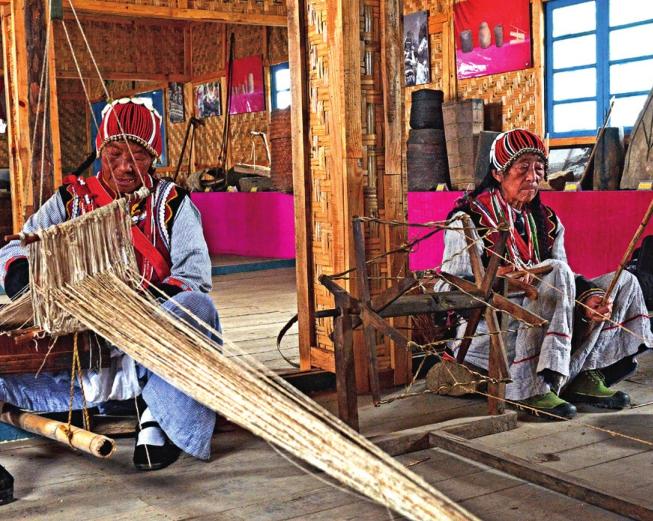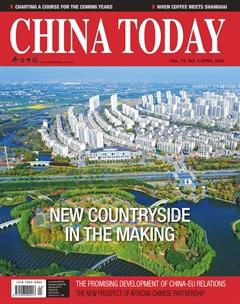Fugong County:Land of Mysterious Rock Formations
By staff reporter MA LI

WITH the arrival of spring rains, the mountainous Nujiang Grand Canyon in the northwest of Yunnan Province is covered in clouds of mist. The blending of mist and mountain scenery creates a mystical ambiance that heralds the change of seasons.
Nestled in the central lush area of the Nujiang Grand Canyon is a county named Fugong. It covers an area of 2,756.44 square kilometers, and borders Myanmar with a borderline stretching some 142 kilometers. The place is of great significance to ecological preservation in southwest China. It is also home to more than 20 different Chinese ethnic groups, which include the Lisu, Nu, Bai, Dulong, Naxi and Pumi. The Lisu and Nu people represent the majority of local ethnic groups. The area is alive with diverse cultures living in a harmonious atmosphere.
Along with unique rock formations, mysterious legends and singing and dancing culture, the area is the center of the Three Parallel Rivers of Yunnan Protected Areas, a UNESCO World Heritage Site.
Folk Culture
People in Fugong have been worshipping deities since ancient times. The only goddess among different deities revered by ethnic groups exists in the mythology of Lisu people. She is Moon Mountain Goddess, who lived on the Moon Mountain. According to mythology, she brought blessings and protected local people from natural disasters. For thousands of years, local Lisu people have been holding the belief that their everyday lives are under the protection of Moon Mountain Goddess.
In this mountainous area there are some stunning rock formations, like the Moon Stone and Sun Stone, magnificent natural pieces of art sculptured by nature. There are also beautiful primitive forests that mesmerize viewers with their natural elegance. The Nujiang River flows through the middle of the two mountain ranges known as the Gaoligong Mountains and the Biluo Snow Mountains, as it makes its way to the sea. On the faces of the towering cliffs ancient cliffs paintings can still be seen with the color now fading with the passing of centuries.
Traces of history can be spotted from the stunning landscape. An ancient Tea Horse Trail, which passes by springs, terraced fields, and green rivers, is a living testament of ancient-time human activities in the Nujiang Grand Canyon. The lakes, waterfalls and rare plants, watched over by the central coroneted Crown Mountain, are also home to a variety of wild animals and exotic plants, all living in harmony with their human neighbors.
This region is full of vitality and passion. The largest traditional folk festival in the area is the Lisu Kuoshi Festival — kuo means year and shi means new. It is a Lisu equivalent to the widely celebrated Chinese New Year. The festival has been celebrated by the Lisu people living in the Nujiang region for more than 500 years. During the festival, people pray for health and happiness, good weather, and bountiful harvests in the coming year.
Traditionally, there was no specific date for celebrations. After respected elders in villages decide on the date, households begin preparing for the celebration and notifying their families living outside the village to return home for festivities.
In 2009, the festival was included in the Yunnan provincial intangible culture heritage list. The annual Kuoshi Festival features a variety of local sports contests like shooting arrows and dancing. Chic elements have also been infused and given rise to many fun activities.
The Nu people in Fugong have an art form included in the state-level intangible culture heritage list. It is called the dabiya dance and performed to the melodies of a namesake local musical instrument. Resembling pipa, the instrument has a clear, gentle, but bright sound, making it suitable for creating a festive environment, and can be used to play various styles of melodies.
Natural and Cultural Attractions
The Lisu and Nu people living in the Fugong region have maintained a strong tradition of respecting and protecting nature throughout many generations. As a result, they have successfully preserved intactness of the local forests and ecosystem.
Over recent years, images of rare animals and plants under state-level protection have been captured in Fugong County. They include animal species like sclaters monal, Chinese forest musk and blood pheasant, as well as plant species like big Rhododendron, Chinese yew, and Taiwania flousiana.
Protecting nature has been the goal and responsi-bility of the Fugong people for generations.
A must-see destination for visitors to Fugong is a village named Laomudeng, which means a place people love to visit in the Nu language. Special treats here include Laomudeng tea, which the Nu people have cultivated over many generations, locally prepared fried rice, a hike to the mysterious mountain top, a glance at a splendid riverside cathedral, a campfire party, and an unforgettable art experience brought by dabiya players.
Another amazing site is Zhiziluo Village, former seat of the government of Nujiang Lisu Autonomous Prefecture. In the deserted place, dubbed the City of Memories, visitors can feel the stark difference between the flourishing 1980s and its current desolation, observe the old murals painted on stone walls, and learn about the secret stories of the old houses. The whole of Zhiziluo Village was moved to another location back in the 1970s–1980s, because of predictions that there would be an earthquake and landslide. Today, all that remain are abandoned buildings.
Visitors should also take time out to visit a traditional Lisu home and experience the hospitality of the local people. Visitors can enjoy the flavors of locally prepared fried rice, which combines the rich flavors of mountain-grown vegetables and meat, and then join in with dancing to the sound of folk music.
Local Specialties: Tea and Chinese Black Cardamom
With rich natural resources, Fugong boasts wellbalanced environmental preservation and economic development. The pillar industries rely on making tea and Chinese black cardamom, a widely-used seasoning ingredient in Chinese cooking.
As a Chinese saying goes, “Quality tea is sure to be found on the high mountains covered with mist.”Thanks to its natural environment and traditional tea-making techniques, Fugong County has seen its tea products acclaimed across the country. Tea grown in the area has a very sweet and pleasant flavor. Local brands include Laomudeng Tea and Shiyue Black Tea.
In recent years, with much financial support from the government, an increasing number of companies have come to Fugong to develop their business. The once extensive model of tea economy is now shifting to a modern technology-driven path. Fugong tea now enjoys a good name at home and abroad.
Another cash cow in Fugong is the special spice Chinese black cardamom. It has been a central part of efforts in helping lift local people out of poverty. Dishes like Chinese black cardamom stewed chicken, Chinese black cardamom ribs, and Chinese black cardamom flavored beer are just a few of the many innovative food products using the ginger-like spice.
With their wisdom and dexterity, local people made magic on the ginger-like plant and changed its stalk into exquisite woven slippers and handbags. The fruit is also used to make a line of unique Chinese black cardamom products that include essential oils and beer. In 2018, Fugong County began celebrating a “Chinese Black Cardamom Festival” and “Chinese Black Cardamom Culture Week” to increase its reputation and attract tourists.
Thanks to its unique natural resources, rich ethnic minority folk culture, diverse cuisine, and long history, Fugong County made the list of “100 Beautiful Destinations for Spring Tours in 2021.”
- CHINA TODAY的其它文章
- Dizi:Jovial Melodies Played on an Ancient Instrument
- The Chinese Path to the Rule of Law
- Beijing Jade Carving:A Time-Honored Craft
- When French Design Meets Chinese Manufacturing
- Modern Dutch-Chinese Dictionary,Cultural Fruit of Sino-Dutch Exchanges
- Zhi Yueying:Nurturing Children in the Mountain

